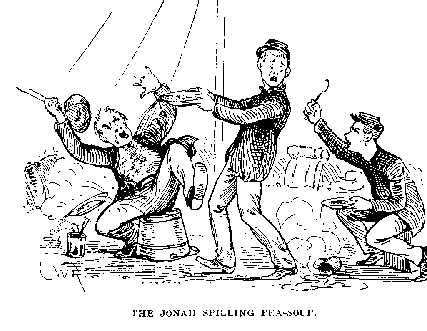
What is a "Jonah?"
An excerpt from the section "Jonahs and Beats" from John D. Billings' indispensable work Hard Tack and Coffee. The much-photocopied illustrations are by Charles W. Reed.
Now, accidents will happen to the most careful and the best of men, but the soldier whom I have been describing could be found in every squad in camp - that is, a man of his kind. Such men were called "Jonahs" on account of their ill luck.
 Perhaps this particular Jonah after getting his tin plate full of hot pea-soup was sure, on entering the tent, to spill a part of it down somebody's back. The higher he could hold it the better it seemed to please him as he made his way to his accustomed place in the tent, and in bringing it down into a latitude where he proposed to eat it he usually managed to dispose of much of the remainder, either on his own or somebody else's blankets.
Perhaps this particular Jonah after getting his tin plate full of hot pea-soup was sure, on entering the tent, to spill a part of it down somebody's back. The higher he could hold it the better it seemed to please him as he made his way to his accustomed place in the tent, and in bringing it down into a latitude where he proposed to eat it he usually managed to dispose of much of the remainder, either on his own or somebody else's blankets.
When pea-soup failed him for a diversion, he was a dead shot on kicking over his neighbor's pot of coffee, which the owner had put down for a moment while he adjusted his lap-table to receive his supper. The profuseness of the Jonah's apologies - and they always were profuse, and undoubtedly sincere - was utterly inadequate as a balm for the wounds he made. Anybody else in the tent might have kicked the coffee to the remotest bounds of camp with malice aforethought, and it would not have produced a tithe of the aggravation which it did to have this constitutional blunderer do it by accident.
 It may be that he wished to borrow your ink. Of course you could not refuse him. It may
have been made by you with some ink powders sent from home - perhaps the last you had and which you should want yourself that very day. It mattered not. He took it with complacency and fair promises, put it on a box by his side and tipped the box over five minutes afterward by the watch.
It may be that he wished to borrow your ink. Of course you could not refuse him. It may
have been made by you with some ink powders sent from home - perhaps the last you had and which you should want yourself that very day. It mattered not. He took it with complacency and fair promises, put it on a box by his side and tipped the box over five minutes afterward by the watch.
Cooking was the forte of this Jonah. He could be found most any time of day - or night, if he was a guardsman - around the camp-fire with his little mess of something in his tomato can or tin dipper, which he would throw an air of mystery around every now and then by drawing a small package from the depths of his pocket or haversack and scattering some of its contents into the brew.
But there was a time in the history of his culinary pursuits when he rose to a supreme height as a blunderer. It was when he appeared at the camp-fire which, by the way, he never kindled himself, ready to occupy the choice places with his dishes; and after the two rails, between which fires were usually built, had been well burdened by the coffee-pots of his comrades it presented an opportunity which his evil genius was likely to take advantage of; for then he was suddenly seized with a thought of something else that he had forgotten to borrow. Turning in his haste to go to the tent for this purpose he was sure to stumble over the end of one or both of the rails, when the downfall of the coffee pots and the quenching of the fire followed as a matter of course.
 At just this point in his career it would be to the credit of his associates to drop the curtain on the picture; but the sequel must be told. The average soldier was not an especially devout man, and while in times of imminent danger he had serious thoughts, yet at other times his many trials, his privations, and the rigors of a necessary discipline all conduced to make him a highly explosive creature on demand. Moreover, coffee and sugar were staple articles with the soldier, and the least waste of them was not to be tolerated under ordinary circumstances; but to have a whole line of coffee-pots with their precious contents upset by the Jonah of the tent in his recklessness was the last ounce of pressure removed from the safety valve of his tent-mates' wrath; and such a discharge of hard names and oaths, "long, loud, and deep," as many of these sufferers would deliver themselves of, if it could have been utilized against the enemy, might
have demolished a regiment. And the others who did not give vent to their passions by blows or the use of strong language seemed to sympathize very keenly with those who did. Two chaplains apiece to some of the men would have been none too many to hold them in check.
At just this point in his career it would be to the credit of his associates to drop the curtain on the picture; but the sequel must be told. The average soldier was not an especially devout man, and while in times of imminent danger he had serious thoughts, yet at other times his many trials, his privations, and the rigors of a necessary discipline all conduced to make him a highly explosive creature on demand. Moreover, coffee and sugar were staple articles with the soldier, and the least waste of them was not to be tolerated under ordinary circumstances; but to have a whole line of coffee-pots with their precious contents upset by the Jonah of the tent in his recklessness was the last ounce of pressure removed from the safety valve of his tent-mates' wrath; and such a discharge of hard names and oaths, "long, loud, and deep," as many of these sufferers would deliver themselves of, if it could have been utilized against the enemy, might
have demolished a regiment. And the others who did not give vent to their passions by blows or the use of strong language seemed to sympathize very keenly with those who did. Two chaplains apiece to some of the men would have been none too many to hold them in check.
